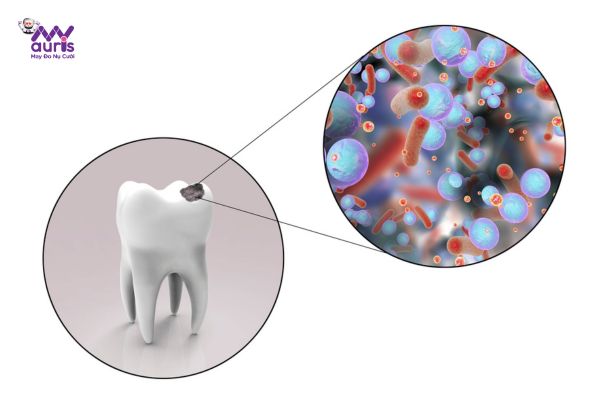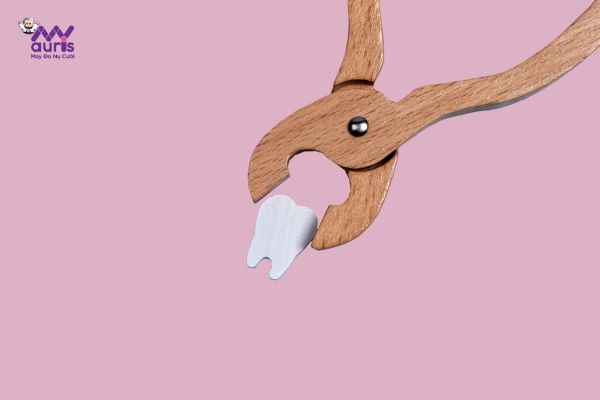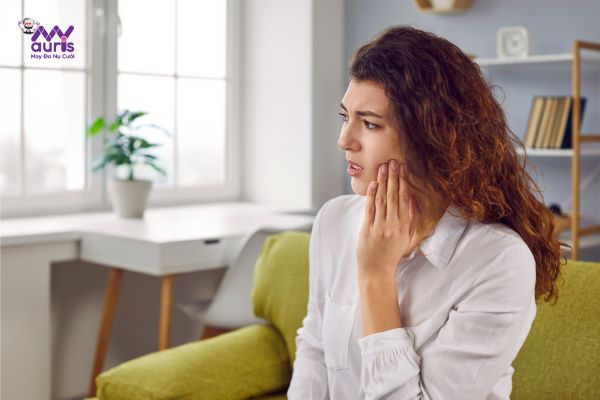A broken tooth is a common condition in both children and adults. Depending on whether the crack is small or large, the doctor will prescribe appropriate treatment. So should a broken tooth be extracted? Let’s answer in detail with My Auris dentistry through the following article.
Learn about broken decayed teeth
A broken decayed tooth is a tooth crown with cracks. If left for a long time, large holes can appear on the tooth. These teeth are characterized by being very brittle and prone to cracking when chewing or having an external impact.
When a severely decayed tooth is not treated promptly, the bacteria in the tooth socket combined with the bacteria existing in the oral cavity will further attack the decayed tooth, causing them to break and crack even more. These teeth gradually erode and crack, leaving only the roots.

When cavities break, you will have to face many oral health effects. Therefore, you should monitor your oral health and need to see a doctor immediately to check whether the condition is decayed or not. If detected in time, decayed teeth will not be filled in time, preventing large breaks.
- Pain is clearly evident and lasts for a long time without going away. In particular, the pain is most evident when eating and drinking.
- Can observe holes and cracks on the tooth crown. A broken tooth is often yellow in color and has a black surface due to bacteria attacking the tooth enamel, causing the tooth to lose its structure and become brittle and more likely to break.
- The gums are swollen and bleeding. Bacteria present in the deep and oral cavity cause the gums to become sensitive and more susceptible to inflammation.
Should a broken tooth be extracted?
Depending on the level of decay and breakage of the tooth, the doctor determines the appropriate treatment method. Soshould a broken tooth be extracted?
- Tooth filling: for small broken teeth, the doctor will not prescribe tooth extraction but will prescribe tooth filling. First, the doctor will clean the decayed tooth, perform oral hygiene, then fill in the cavity and restore the shape of the tooth.
- Ceramic dental crowns: this is also a method applied todecayed tooth. This method applies to larger cavities but still retains the tooth tissue structure. The doctor removes the decayed tooth, cleans it, then grinds the tooth to cover it with porcelain. This ceramic crown is an inert material, limiting plaque and preventing bacteria from attacking real teeth inside.
- Tooth extraction and dental implant. In cases where tooth decay is too severe, the decay erodes all the tooth, leaving only the root, sometimes affecting the pulp. In this case, the doctor is required to remove the decayed tooth to prevent the cavity from spreading to neighboring teeth, affecting the health of the entire jaw. After tooth extraction, depending on the condition and conditions of each person, the doctor advises on dental implantation with porcelain bridges or dental implants.

Consequences if a broken tooth is not treated
If you are subjective and do not pay attention to the cavities in your jaw until they become severe, you will face many difficulties in daily activities and eating. Here are some consequences caused by broken teeth:
- Loss of aesthetics: decayed teeth cause the tooth structure to be intact. If they are front teeth, it will greatly affect the aesthetics. From there, he hesitates to communicate and loses confidence.
- Long-lasting pain: Tooth decay causes long-lasting and persistent pain. Not only does it cause toothache, but it also causes headaches. The reason is because the dental pulp contains nerves that connect directly to the nerves of the brain. When a tooth is broken, the pulp will lose much of its protection, and bacteria can easily attack, leading to pain and even deep penetration, causing infection. Cerebral nerves connected to spinal nerves send signals to produce headache symptoms.
- Causes bad breath: bacteria from tooth decay along with bacteria in the oral cavity grow to create bad breath.
- Wears tooth fillings: fillings are usually located on the surface, protecting the teeth from impact. However, if the decay becomes more severe, the filling will fall out, causing the tooth to break even more. The reason is that the tooth structure has changed, the tooth is no longer enough for the filling to fit tightly onto the tooth. Through chewing activities, the filling will come out of position.
- Tooth abscess: this is a condition that often occurs when a tooth is broken. Broken teeth create conditions for bacteria to attack the teeth, forming pus pockets in the gum area around the decayed toothor in the tooth or bone around the tooth.
- Infection: if a decayed tooth is not taken care of and treated promptly, the decay will get worse and worse, and can erode the tooth to the pulp and even the root. More serious is causing infection, infection around the tooth bone, causing that part of the bone to disappear.
- Tooth damage or tooth loss: Severe tooth decay can cause the tooth to lose its structure. If not fixed soon, the tooth will have to be removed.
- Causes many other diseases: cavities contain many bacteria. If left untreated, bacteria will cause many other diseases affecting oral health.
- Dental-related cancer: research shows that tooth decay accounts for 62% of the total causes of oral cancer such as nasopharyngeal cancer, bone cancer, and marrow cancer.
- Sinusitis: the nose and throat are connected, so if bacteria exist in the oral cavity, they can spread to the nose area, affecting this part.

Therefore, if you discover tooth pain, you should go to the hospital/dentist to have a doctor examine and check your oral health. From there, if tooth decay is detected, the doctor will take measures to quickly and promptly correct and block the cavity. This avoids causing many dangerous complications for oral health.
In addition, to protect oral health and strong, healthy teeth, everyone should also have good care and hygiene:
- Follow your teeth regularly at least twice a day.
- Use dental floss and water floss to remove plaque and food stuck in between meals after meals
- Use mouthwash or salt water to kill bacteria and clean the oral cavity
- Limit the use of foods, foods high in sugar, acid

Thus, with the information in the article about should broken decayed teeth be extracted hopefully everyone can answer their questions. From there, there is the best way to care for and protect your teeth. Please contact My Auris dentistry for more detailed advice and answers.
Anh Thy





